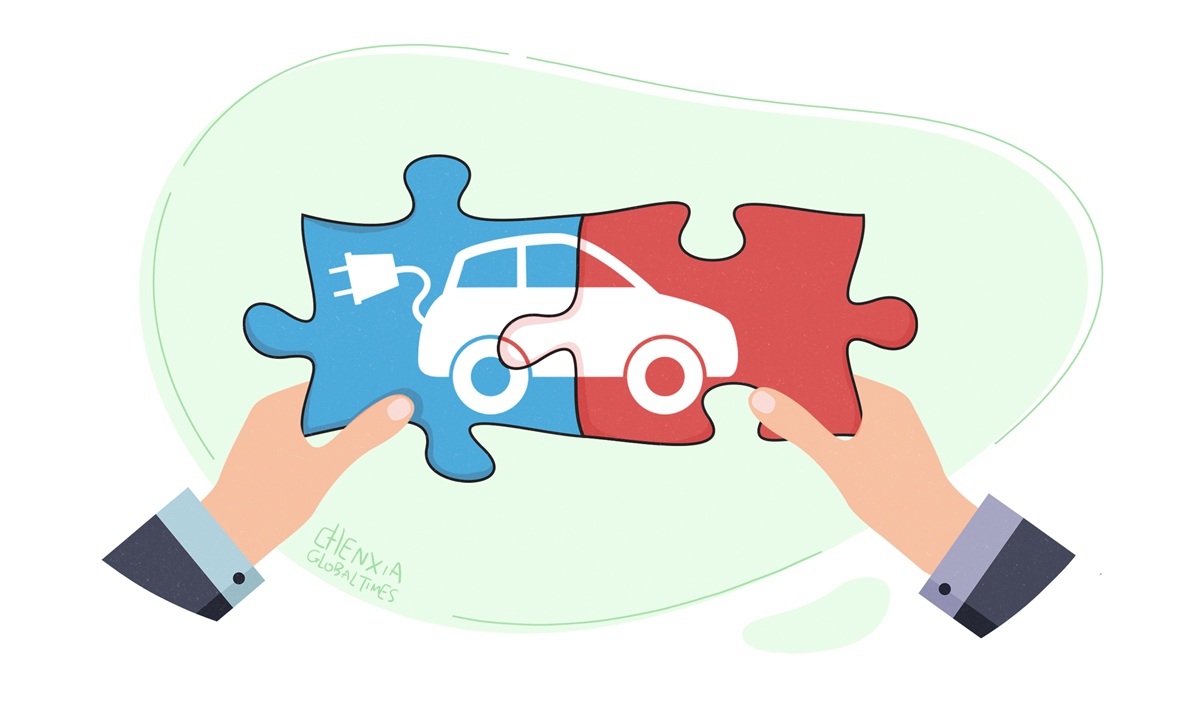EU's attempt to 'derisk' Chinese batteries 'biased, not feasible'

Illustration: Chen Xia/Global Times
Seemingly coming to its "waking up" moment again, the European Union (EU) is repeating its "de-risk" narrative with the world's second largest economy in the latest push which Chinese observers said results from the EU's ideologically biased policy against China. This time EU's eyes are fixated on lithium-ion batteries and fuel cells, where China has an edgein global markets thanks to its competitive industrial chain over years of building-out.
Believed to be a gesture to impose pressure on China ahead of a high-level economic and trade dialogue between the EU and China, penciled in for September 25 as media reported, the bloc's seeking reduction of so-called dependence on Chinese economy will ultimately prove unfeasible, which will not only hamstring China-EU ties that have been recovering, but also exacerbate its own economic woes and drag on progress toward its decarbonization goal, observers said.
Faced with challenges posed by US' rising protectionism that weighs on the world's economic recovery, China and the EU, two large economic powers, should forge stronger ties in deepening their cooperation on the principle of mutual benefits instead of setting up hurdles citing imaginary threats, analysts said, calling on the bloc to maintain its China economic policies independent instead of being at the mercy of the US.
Absurd comparison
Chinese observers' comment followed a Reuters report on Monday saying that the bloc could become as dependent on China for lithium-ion batteries and fuel cells by 2030 as it was on Russia for energy before the Russia-Ukraine conflict unless it takes strong measures, citing a document prepared for EU leaders that was seen by the media agency.
The document will be the basis of discussions on Europe's economic security during a meeting of EU leaders in Granada in Spain on October 5 when they will discuss the European Commission's proposals to reduce the risk of Europe being too dependent on China and the need to diversify toward Africa and Latin America, according to the Reuters report.
In 2021, prior to the Russia-Ukraine conflict, the EU took more than 40 percent of its total gas consumption, 27 percent of oil imports and 46 percent of coal imports from Russia, according to the European Commission.
"It's quite absurd to be drawing a comparison between China and Russia in the energy case as these are two unrelated things," Cui Hongjian, director of the Department of European Studies at the China Institute of International Studies, told the Global Times on Monday.
"Closer economic engagement is actually a result of natural market choice, which should not be interpreted as political risks," he said, adding that some EU leaders' China policy in the economic sector is "going a bit maniac."
Last week, China's Ministry of Commercelodged serious concerns and strong opposition to the EU's investigation into Chinese electric vehicle (EV) makers over subsidies, calling the EU's behavior "blatant protectionism" that will seriously disrupt and distort the global automotive supply chain, and have a negative impact on China-EU economic and trade ties.
European Commission President Ursula von der Leyen announced on Wednesday that the EU is launching a probe into Chinese EVs, claiming the prices of imported Chinese vehicles are being kept "artificially low by huge state subsidies."
The probe came just days after Chinese EV makers shined at the IAA Mobility in Munich by launching their cutting-edge products at the auto show.
"The impactful presence of Chinese EV brands at the auto show has caused some unnecessary anxiety among EU politicians as if made-in-China EVs are flooding the market," Zhao Yongsheng, director of the French Economic Studies Center at the University of International Business and Economics in Beijing, told the Global Times on Monday.
In fact, the penetration ratio of Chinese EVs in Europe is overestimated, Zhao said, adding that despite the dominating narrative at the moment is about the big potential of Chinese carmakers in Europe, the registration volume of Chinese brands is actually less than anticipated.
In the first quarter of 2023, most European EV sales were captured by the top five automotive groups - Volkswagen, Tesla, Stellantis, Mercedes-Benz and Hyundai-Kia. They accounted for nearly two-thirds of the market share, according to market research agency Counterpoint.
Opportunity, not risk
There is no major conflict between China and the EU, and the two sides should push forward their pragmatic cooperation under the principle of mutual benefits, officials and experts said.
China's development is an opportunity, not a risk, for Europe. Both sides should stay committed to opening-up and cooperation for mutual benefit and win-win results. No matter at present or in the future, China is and will remain a trustworthy friend and partner of Europe, Chinese Premier Li Qiangsaid when meeting with President of the European Council Charles Michel on the sidelines of the G20 summit in India on September 10, the Xinhua News Agency reported.
Separately, in meeting with Maltese Foreign Minister Ian Borg on Saturday, Chinese top diplomat Wang Yi said China-EU cooperation outweighs differences and the two sides are partners instead of rivals, noting China has consistently supported the EU's strategic independence and European integration, according to Xinhua.
"Instead of being focused on such complaint as Chinese brands will undercut its European peers based on its stellar cost-efficiency performance, EU leaders should well notice the opportunities that Chinese EV supply chain has brought to the continent in terms of technology and industrial upgrade," Yu Qingjiao, secretary general of the Zhongguancun New Battery Technology Innovation Alliance, told the Global Times on Monday.
"Giving up on China's such edge in the supply chain could put a region's or country's development of its own EV sector at an obvious disadvantage," Yu noted, adding that if the EU opts to build up its own supply chain from the scratch just because of the potential risks as exaggerated by some politicians, it will certainly drag on the bloc's green mobility transformation - the EU is committing to achieve carbon neutrality by 2050.
"It is also an unfeasible move for the EU given a number of challenges due to lack of experience and capabilities to source key components for EV batteries," Yu said.
Ningde-based CATL, the largest EV battery maker in the world, has two factories in Europe with one operating in Germany and the other under construction in Hungary, which is expected to create more than 9,000 job opportunities for the East European country, according to media reports.
"What the EU's real 'waking up' moment should be sober awareness on teaming up with China economically by following its own independent China policy instead of being bound onto the US wagon of unilateralism," Cui noted.
Photos
Related Stories
- Chinese vice premier stresses high-level opening up in digital area
- China, Malta agree to jointly promote China-EU cooperation
- Closing 'greenhouse' won't boost European EV competitiveness
- China strongly dissatisfied with EU's anti-subsidy probe into Chinese EVs
- Airbus final assembly line in Tianjin witnesses robust China-EU aviation cooperation
- China, EU can make G20 more inclusive
- Chinese premier urges EU to provide non-discriminatory environment for Chinese enterprises
- EU-China relations among "most strategically important" ones, says Slovenian minister
- China, EU remain major trading partners despite decoupling, de-risking talks
- China has never deliberately sought surplus in trade with EU: spokesperson
Copyright © 2023 People's Daily Online. All Rights Reserved.









